Related Articles
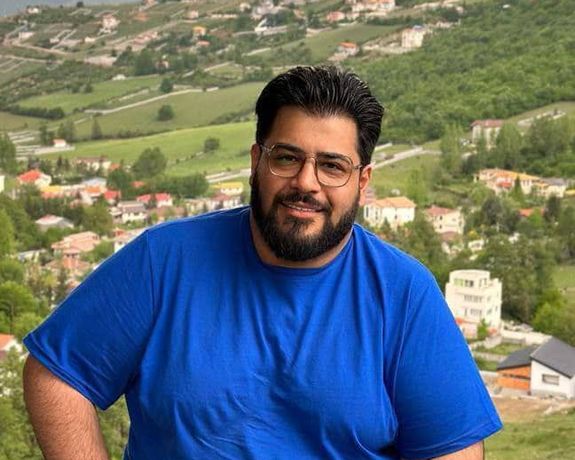
Iran late last month executed a young man accused of helping Israel carry out assassinations and bomb attacks, but a prominent activist, human rights groups and a leaked call from the condemned prisoner indicate the charges were false.
Mohsen Langarneshin, a 32-year-old network security engineer, was executed in Ghezel Hesar Prison on April 30 on charges of “waging war against God” and “spreading corruption on Earth,” according to the judiciary’s media outlet Mizan.
Beyond vague headlines in state-controlled outlets, few details of his background and case were publicly available. But rights activist Ryma Sheermohammadi and sources close to Langarneshin told Iran International that the case was fabricated, his trial deeply flawed and confessions he made were extracted under torture.
Iranian authorities were so keen to round up suspects amid serial Israeli intelligence breaches, Sheermohammadi said, that they accused him of being involved in the death of a top missile general they have publicly insisted died by accident.
“This case was manufactured,” Sheermohammadisaid. “He was executed on charges of espionage without a shred of material evidence. The case was built entirely on forced confessions extracted under extreme physical and psychological torture.”
“Mohsen was an easy target for them. They tortured him to gain confessions out of him and he didn’t even tell anyone and fell for their lies that they would spare his life if he complied,” a source close to Langarneshin told Iran International.
Accidental blast
According to Sheermohammadi, Langarneshin was accused of involvement in three high-profile incidents: the 2011 explosion that killed the architect of Iran’s missile program Brigadier General Hassan Tehrani Moghaddam, the 2022 assassination of Colonel Hassan Sayyad Khodaei in Tehran and a 2023 bombing at a munitions factory in Isfahan.
Tehrani Moghaddam, a brigadier general in the Islamic Revolutionary Guard Corps (IRGC), played a central role in developing Iran’s long-range missile arsenal and was widely regarded as the father of Iran’s missile program.
In 2011, he died alongside over a dozen others in a blast west of Tehran - a huge blow to Iran's military establishment but one officials conceded was an accidental detonation during weapons testing.
“At the time (of Tehrani Moghaddam's death), Mohsen was just 19 years old and had no known link to the incident,” Sheermohammadi said.
Sheermohammadi also dismissed allegations tying Langarneshin to the 2022 assassination of Quds Force officer Sayyad Khodaei.
“In the 2022 assassination of Colonel Sayyad Khodaei, Mohsen was accused of conducting surveillance using a motorcycle,” she said. “But he was living in Isfahan at the time, not Tehran, and there is extensive documentation — CCTV footage, phone records, vehicle ownership — proving his absence from the crime scene.”
Langarneshin was also accused of being involved in a 2023 bombing in Isfahan. “But Mohsen had already moved to Tehran well before the incident,” she said. “Again, workplace footage and telecom records confirm this. Another individual was arrested and executed for that very bombing, which raises serious questions about duplicated or fabricated charges.”
Langarneshin had previously worked under contract as a network security engineer at Imam Hossein University, a US-designated military-linked institution controlled by the IRGC that trains specialists in cyber defense, intelligence and missile technology.
“Mohsen had a brief professional association with Imam Hossein University — an IRGC-affiliated institution,” Sheermohammadi said. “That link gave intelligence agencies just enough of a pretext to cast suspicion on him, years later.”
But she said his affiliation ended after 2019 protests which started over fuel price hikes but quickly turned political. They were quashed by authorities with deadly force.
“Mohsen made a principled decision to resign from the university following the bloody crackdown on protesters in November 2019,” she said. “He could no longer, in good conscience, be affiliated with institutions tied to state violence. That act of integrity may have marked him as politically unreliable in the eyes of the regime.”
Sheermohammadi believes Langarneshin was ultimately targeted not for what he did, but his profile fit what investigators were seeking in a defendant.
“The intelligence services were under pressure to deliver ‘results,’ especially in cases involving alleged foreign plots,” she said.
“Mohsen’s international travel history, financial independence through his car business, and technical expertise all made him an easy target — someone who could be cast into a ready-made narrative of espionage, even when the evidence said otherwise.”
Call from Evin Prison
In a recorded phone call from Evin Prison, a copy of which was obtained by Iran International, Langarneshin described being psychologically tortured in a Ministry of Intelligence safehouse the night of his arrest.
His captors, he said, threatened him with flogging, forced him to write false confessions and later filmed him admitting to his alleged crimes based on their cues.
“They told me to say I bought a motorbike, mounted a camera on it and went to film,” he said in the call. “That was very odd — there was never any mention of what kind of motorbike it was or where it came from. I never did that. They made me say it anyway.”
After resisting, he said he was blindfolded, chained in a schoolyard, and filmed again. “They said, ‘This video is for before your execution. If you read the confession we wrote, maybe we’ll change your sentence to life imprisonment.’”
Judge Abolghasem Salavati of Tehran’s Revolutionary Court—referred to by dissidents as the “hanging judge” for his record of issuing numerous death sentences in politically sensitive cases—and upheld by the Supreme Court.
All three retrial requests were rejected — the last one dismissed within two days and without explanation.
His father, Massoud Langarneshin, released a video the day before the execution, calling the case “full of flaws, ambiguities and questions.” His mother also confirmed she had her final visit with Mohsen that same day and appealed for help.
Several human rights groups including Norway based rights group Iran Human Rights (IHR) condemned the hanging, which IHR said took place alongside several other prisoners," said IHRNGO Director Mahmood Amiry-Moghaddam.
“We must raise the cost of these extrajudicial killings for the authorities through strong international reactions and widespread protest.”
Sheermohammadi said Iranian authorities refused to tell Langarneshin family where he was buried and had forced them to delete all their social media posts.
“Mohsen’s family is being forced into silence by intelligence agents. They have been told not to speak to the media about Mohsen. Only if they obey the conditions set by the intelligence agents are they willing to disclose his burial site,” another source told Iran International.
After eleven days of uncertainty, Sheermohammadi confirmed that Langarneshin had been buried in Behesht Zahra cemetery in south Tehran, alongside other executed political prisoners.
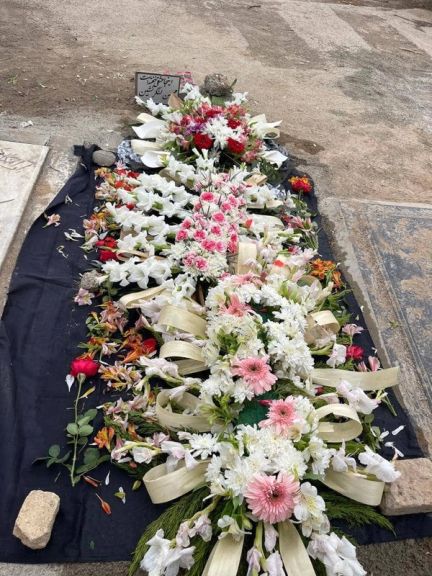
The Iranian negotiating team has been instructed not to proceed with any talks that include proposals to halt or reduce uranium enrichment to zero, Iran International has learned.
According to information obtained by Iran International, a formal directive was issued to the delegation ahead of the fifth round of indirect negotiations with the United States in Rome.
The order said any discussion of ending enrichment is off-limits, and negotiators are required to reject such proposals outright.
Foreign Minister Abbas Araghchi’s televised interview, aired the night before the talks began, was part of this coordinated approach.
The appearance, organized in consultation with the Supreme National Security Council and the sanctions negotiations committee, aimed to publicly reinforce Tehran’s red lines and manage expectations over a possible failure of the Rome talks.
The messaging also sought to frame the US as responsible should the talks collapse, by emphasizing Iran’s refusal to abandon what it views as its core nuclear rights.
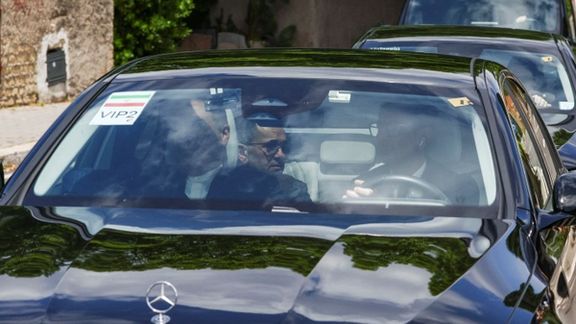
The Iranian negotiating team has been instructed not to proceed with any talks that include proposals to halt or reduce uranium enrichment to zero, Iran International has learned.
According to information obtained by Iran International, a formal directive was issued to the delegation ahead of the fifth round of indirect negotiations with the United States in Rome.
The order said any discussion of ending enrichment is off-limits, and negotiators are required to reject such proposals outright.
Foreign Minister Abbas Araghchi’s televised interview, aired the night before the talks began, was part of this coordinated approach.
The appearance, organized in consultation with the Supreme National Security Council and the sanctions negotiations committee, aimed to publicly reinforce Tehran’s red lines and manage expectations over a possible failure of the Rome talks.
The messaging also sought to frame the US as responsible should the talks collapse, by emphasizing Iran’s refusal to abandon what it views as its core nuclear rights.
Iran has asked Oman to intervene and help persuade the United States to ease its hardline position in the ongoing nuclear negotiations, two diplomatic sources in Tehran told Iran International.
Iran’s foreign ministry recently sent a message to Omani officials, urging them to implore Washington to soften its demands, the sources told Iran International on condition of anonymity.
“Given the dependency of Iran’s financial markets—currency, gold, and stocks—on the outcome of the negotiations, the message emphasized that a diplomatic compromise is possible if the United States moderates its position,” one source said.
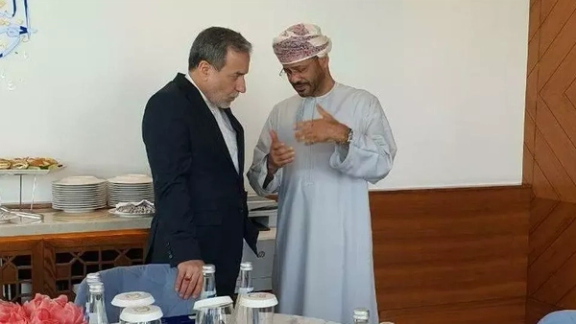
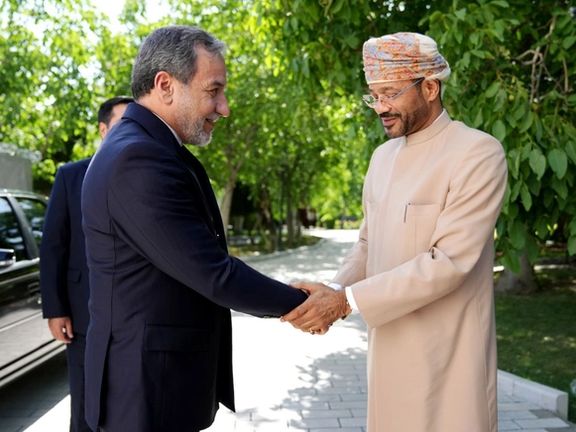
Iran has asked Oman to intervene and help persuade the United States to ease its hardline position in the ongoing nuclear negotiations, two diplomatic sources in Tehran told Iran International.
The Trump administration has ruled out any Iranian uranium enrichment, calling it a red line in negotiations with the Islamic Republic — a condition Iran considers unacceptable.
Iran’s foreign ministry recently sent a message to Omani officials, urging them to implore Washington to soften its demands, the sources told Iran International on condition of anonymity.
“Given the dependency of Iran’s financial markets—currency, gold, and stocks—on the outcome of the negotiations, the message emphasized that a diplomatic compromise is possible if the United States moderates its position,” one source said.
Foreign Minister Abbas Araghchi said on Tuesday that Tehran was reviewing the possibility of holding a new round of negotiations with Washington—an indication that Iran was awaiting a response from the US via Oman, the sources told Iran International.
Oman's foreign minister announced on Wednesday that Iran and the United States will hold the fifth round of nuclear talks in Rome on Friday, May 23.
No clear alternative
Iranian officials, the sources added, are concerned about the absence of a clear diplomatic alternative if talks collapse.
There is currently no alternative strategy to manage the crisis and govern the country in the event of the negotiations’ failure, they said, stressing that maintaining the diplomatic track remains a priority for Tehran.
Reuters reported on Wednesday, citing three unnamed Iranian sources, that the Iranian leadership has no clear contingency plan should the nuclear talks fail.
The sources suggested that while Iran might pivot toward China and Russia as an alternative strategy, such a path would be fraught with challenges. China is entangled in a trade war with the US, and Russia remains mired in its military conflict in Ukraine.
The alternative plan is simply to continue the pre-negotiation strategy, Reuters reported citing a senior Iranian official, suggesting that Iran would avoid escalating tensions while reinforcing ties with allies such as Russia and China
The UAE's state-owned The National reported on Monday citing two Iranian officials, that the negotiations between Washington and Tehran have stalled due to disagreements over uranium enrichment levels, and Tehran has not yet accepted Oman's invitation for a fifth round of talks with the US.
On Tuesday Iran’s Supreme Leader Ali Khamenei dismissed US demands to halt uranium enrichment as “nonsense and excessive.” He also warned that the likelihood of successful negotiations remains low, signaling a toughening stance at the highest levels of the Islamic Republic.
Iran's President Masoud Pezeshkian will visit Oman on May 27–28 at the invitation of Sultan Haitham bin Tariq, the president's office announced on Wednesday.
While Oman is mediating nuclear talks between Iran and the United States, the nuclear issue is not currently on the official agenda for Pezeshkian's visit.
